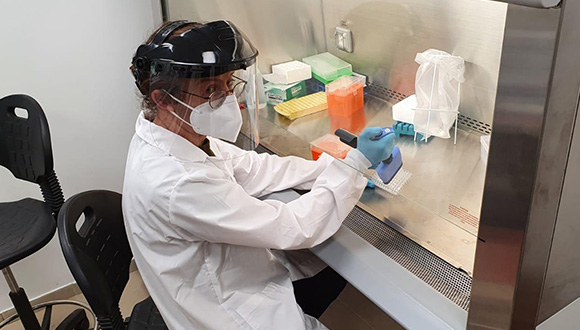
Tel Aviv University Sets Up Emergency Lab to Expand COVID-19 Testing
Written on | Medicine
specialized lab, run by TAU researchers and graduate students, was built in 3 days
University has built an emergency COVID-19 testing lab, which will allow Israel to perform an additional 2,000 coronavirus tests per day. The new facility was born virtually overnight of the interdisciplinary efforts of TAU researchers, graduate students and management staff of the Sackler Faculty of Medicine and the George S. Wise Faculty of Life Sciences. Construction for the lab began on Tuesday, March 24th, at 7 a.m., and was completed Friday, March 27th, with engineers, construction workers, professors and graduate students working around the clock. A Health Ministry official reviewed the lab to ensure that it meets health and safety protocols before commencing operations. “We realized immediately how critical testing was and how we at the University could contribute to Israel’s diagnostic landscape,” explains Prof. Ariel Munitz of Sackler’s Faculty of Medicine, who spearheaded the establishment of a testing lab on campus. “It was not an easy decision. It was unclear whether the Health Ministry would approve, and we did not know exactly what the protocol was or what was required – but we knew we needed to act.” Getting ready to perform 2,000 coronavirus tests per day
“We all understood that there was a national crisis at hand, and our first thought was how to help and contribute – we have put all other considerations aside,” adds Prof. Eran Bacharach of the School of Molecular Cell Biology and Biotechnology, Wise Faculty of Life Sciences, who is in charge of the TAU BSL2+ facility dedicated to studies of viruses and bacteria.
Prof. Bacharach also helped coordinate a TAU volunteer initiative currently underway at Israeli hospitals. “A week ago we had to convince laboratories to accept our volunteers, but today labs are approaching us.”
As a result of the TAU volunteer initiative, some 170 student volunteers are currently embedded in 12 laboratories in hospitals, including Tel Aviv Sourasky Medical Center (Ichilov Hospital), Shamir Medical Center (Assaf Harofeh), Rambam Health Care Campus, Soroka Medical Center, and HMOs across Israel.
Getting ready to perform 2,000 coronavirus tests per day
“We all understood that there was a national crisis at hand, and our first thought was how to help and contribute – we have put all other considerations aside,” adds Prof. Eran Bacharach of the School of Molecular Cell Biology and Biotechnology, Wise Faculty of Life Sciences, who is in charge of the TAU BSL2+ facility dedicated to studies of viruses and bacteria.
Prof. Bacharach also helped coordinate a TAU volunteer initiative currently underway at Israeli hospitals. “A week ago we had to convince laboratories to accept our volunteers, but today labs are approaching us.”
As a result of the TAU volunteer initiative, some 170 student volunteers are currently embedded in 12 laboratories in hospitals, including Tel Aviv Sourasky Medical Center (Ichilov Hospital), Shamir Medical Center (Assaf Harofeh), Rambam Health Care Campus, Soroka Medical Center, and HMOs across Israel.
.jpg) TAU volunteers at Tel Aviv Sourasky Medical Center (Ichilov Hospital)
But after technicians at the Sheba Medical Center’s laboratory were quarantined as a result of exposure to COVID-19, TAU recognized an opportunity to contribute even further to Israel’s coronavirus efforts by performing public testing.
“We contacted University management, who got involved immediately and quickly approved an emergency budget for the project,” says Prof. Munitz. “The safety of the team operating the lab is and remains our highest priority, and we are taking every necessary precaution in strict alignment with Health Ministry regulations. The goal was to design a lab that could process up to 2,000 tests a day, and we have accomplished it.”
“Usually, setting up a lab takes 4-6 months,” concludes Ofer Lugassi, VP of Engineering and Maintenance at TAU. “To do so within a few days required the extraordinary efforts of project partners working around the clock and adopting innovative ideas, including architect Daniel Zarchi who designed the lab. Without the full mobilization of the entire team, it would never have happened. We learned and solved everything ‘on the go’: from building a new ceiling, something we didn’t anticipate we would need to do, to installing a complex air filtration system that normally takes about a month to set up. Everything was done overnight.”
TAU volunteers at Tel Aviv Sourasky Medical Center (Ichilov Hospital)
But after technicians at the Sheba Medical Center’s laboratory were quarantined as a result of exposure to COVID-19, TAU recognized an opportunity to contribute even further to Israel’s coronavirus efforts by performing public testing.
“We contacted University management, who got involved immediately and quickly approved an emergency budget for the project,” says Prof. Munitz. “The safety of the team operating the lab is and remains our highest priority, and we are taking every necessary precaution in strict alignment with Health Ministry regulations. The goal was to design a lab that could process up to 2,000 tests a day, and we have accomplished it.”
“Usually, setting up a lab takes 4-6 months,” concludes Ofer Lugassi, VP of Engineering and Maintenance at TAU. “To do so within a few days required the extraordinary efforts of project partners working around the clock and adopting innovative ideas, including architect Daniel Zarchi who designed the lab. Without the full mobilization of the entire team, it would never have happened. We learned and solved everything ‘on the go’: from building a new ceiling, something we didn’t anticipate we would need to do, to installing a complex air filtration system that normally takes about a month to set up. Everything was done overnight.”
 TAU researcher checking the lab facilities
Featured image: Prof. Ariel Munitz
TAU researcher checking the lab facilities
Featured image: Prof. Ariel Munitz